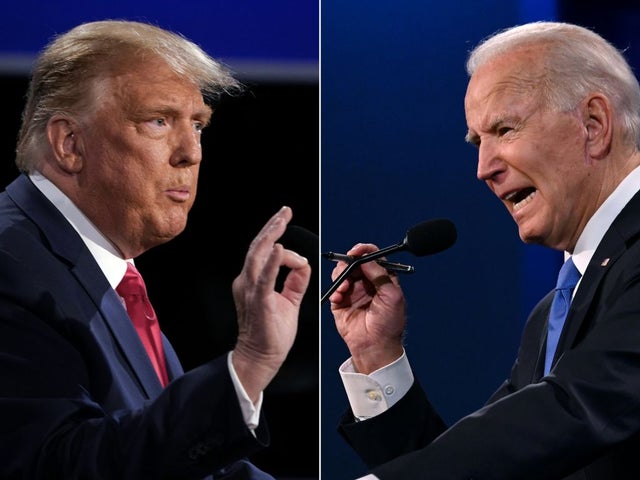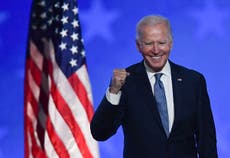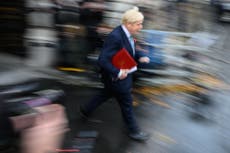Biden faces a war on many fronts – Trump has the tools to make the presidency a poisoned chalice
Trump performed sufficiently well in the election to give him the political oxygen to continue campaigning – and he has plenty of friends in a conservative Supreme Court


Your support helps us to tell the story
From reproductive rights to climate change to Big Tech, The Independent is on the ground when the story is developing. Whether it's investigating the financials of Elon Musk's pro-Trump PAC or producing our latest documentary, 'The A Word', which shines a light on the American women fighting for reproductive rights, we know how important it is to parse out the facts from the messaging.
At such a critical moment in US history, we need reporters on the ground. Your donation allows us to keep sending journalists to speak to both sides of the story.
The Independent is trusted by Americans across the entire political spectrum. And unlike many other quality news outlets, we choose not to lock Americans out of our reporting and analysis with paywalls. We believe quality journalism should be available to everyone, paid for by those who can afford it.
Your support makes all the difference.A record turnout of America’s divided electorate now looks very likely to have delivered a narrow, but disputed, victory for Joe Biden. He will now face an even bigger challenge to govern.
Despite desperate efforts by Donald Trump’s camp to contest the results in key marginal states, it seems clear that Biden will get to the magic 270 electoral college votes once his victories in Michigan, Wisconsin, Arizona and Nevada are officially confirmed. The last is looking narrowest, but Biden is still ahead. Providing it holds, he doesn’t strictly need Pennsylvania’s 20 votes but it would greatly help to build a firewall against subsequent challenges. With a victory in the popular vote, too, he would have a clear moral authority to govern.
Nonetheless, Trump’s career in the New York property market owed much to the deployment of batteries of lawyers to intimidate and out-manoeuvre his competitors. Every legal argument in the book will be deployed to block or invalidate the postal ballots which have tipped the balance in key states. If he can get a case in front of the Supreme Court, he calculates that the justices will forget their oath of impartiality and remember their political debt to the president who appointed them.
It is rumoured he then plans to challenge the make-up of the electoral college. There is also the possible scenario I described in this column three weeks ago, where uncertainty generated by the legal challenges leads to people taking the law into their own hands, leading to a state of emergency and –in effect – a coup d’etat.
There are however some influential voices on the Republican side who want to stop an unseemly legal arm-wrestle, which would bring US democracy into even greater disrepute than it already is. The wily Mitch McConnell, Republican leader in the Senate – whose position is now greatly strengthened by the Democrats’ failure to wrest a majority there – has made it clear that every vote should be counted. He says he will have no truck with legal chicanery designed to frustrate the election result (no doubt calculating that the Democrats could retaliate with challenges to the narrow victories of his own colleagues).
Even if Trump’s attempts to reverse the result fail, and he reluctantly agrees to leave the White House, he has plenty of options to make life for the new president somewhere between very difficult and impossible. Trump performed sufficiently well to give him the political oxygen to continue his relentless campaigning and perpetuate the narrative that he was defeated only by “fraud”. He may well continue as de facto leader of the Republicans with the potential to run again in 2024 or heavily influence the primary by endorsing one of his acolytes (perhaps a member of his own family). He will meanwhile bombard his millions of supporters with tweets whipping up accusations of “corruption” and endorsing conspiracy theories designed to further polarise a divided public.
If he becomes president, Biden faces a war on several fronts: an angry, militant, Trump movement representing the 40 per cent of Americans who supported him regardless of his errors and abuses; a conservative Supreme Court rolling back landmark Democrat legislation as with Obama-care, as well as socially liberal statutes; and a hostile Senate potentially stopping his attempts to legislate.
A key test in the New Year will be his capacity to introduce a fresh economic stimulus, to extend benefits for families now in desperate financial straits and to bail out financially stricken municipalities. But Republican legislators could block anything meaningful. Biden will not be able to launch a New Deal, green or otherwise. Biden prides himself on his one-nation, consensual style and ability to persuade and conciliate. But those qualities belong to a bygone era.
He will not be totally powerless. He will be able to use Executive Orders whose potency were demonstrated by Trump. Re-joining the Paris Accord on Climate Change and the Iranian non-proliferation agreement are examples. He will be able to appoint Federal officials and restore respect for professional standards to government agencies, the security services and the armed forces. There will no longer be an Attorney General acting as a personal lawyer. But the politicisation of the judiciary and hitherto non-political roles may have already have gone too far: Democrats will want to reverse the hundreds of state-level judicial appointments made by the Trump administration.
There are also dangers that eager Democrats will want to go after Trump for his various financial and other abuses in office. The threat to "Jail Hillary" will not have been forgotten. The United States could be already be on the trajectory marked out by other unstable democracies in Peru, Mexico and Colombia where one of the political priorities of any new administrations is to imprison its predecessors. I doubt that Biden will want to perpetuate the spiteful and vindictive politics of Donald Trump but the people around him may not be so scrupulous and generous.
Given the constraints on domestic action, Biden may well see himself as a “foreign policy president” and that would correspond to his own expertise and inclination: a Democratic George Bush Snr. But the world is no longer, as it was three decades ago, in awe of American “soft power”. The supposed superiority of “liberal democracy” and an America-led “rules-based international order”, in opposition to crumbling Communist autocracies and maverick dictators, is long gone. Every conversation with the leaders of hostile tyrannies or newly assertive “strong men” will be coloured by the assertion of America’s own, outgoing leader that the Biden Presidency itself rests on ballot-rigging, corruption and a manipulative, undemocratic "deep state".
Moreover, the main strategic adversary now is a highly competent and successful regime in China which combines the dynamism of competitive capitalism with the disciplined conformity of a one party state. The Chinese priority is to strengthen their economy and achieve technological superiority: a competitive challenge the US is currently losing. Biden’s most constructive response would be to revive US support for Obama’s Trans Pacific Partnership as an embryonic alliance of Asian countries fearful of Chinese dominance and to reverse Trump’s foolish, self-defeating, tariff warfare against Japan and other friendly states.
His other challenge will be to revive the cohesion and morale of the Nato alliance, faced with a variety of provocations from Putin’s Russia which, having lost a “friend” in the White House, may be looking to make trouble. The key priority will be to cement good relations with Germany and France. Britain, sadly, will be seen as a cuckoo in the nest: disrupting European cooperation and too close politically to the outgoing Trump administration.
There was only a remote prospect that a Democratic House of Representatives would approve a Trump negotiated trade deal with the UK; now it is dead. A more immediate danger for the UK is that failure to agree a deal with the EU – resulting in disruption and acrimony in the New Year, especially as it affects Ireland – will result in Britain being even more in the dog-house with the Biden administration.
But for Biden the big danger is that being a foreign policy president will draw the US into a variety of poisonous conflicts which Trump was smart enough to avoid and which the US can no longer control: Greece and Turkey; the Caucasus; Iran and Saudi in Yemen; Libya; India and Pakistan; China and Taiwan; North and South Korea; Israel; Syria; Afghanistan, again.
Many of us wish Biden well after his dignified, moderate, competent campaign. He can hardly do other than improve the reputation of the United States, after four years of machismo and malice. But in an uncertain international order, and without much-needed support in Congress, the presidency may yet prove a poisoned chalice.




Join our commenting forum
Join thought-provoking conversations, follow other Independent readers and see their replies
Comments